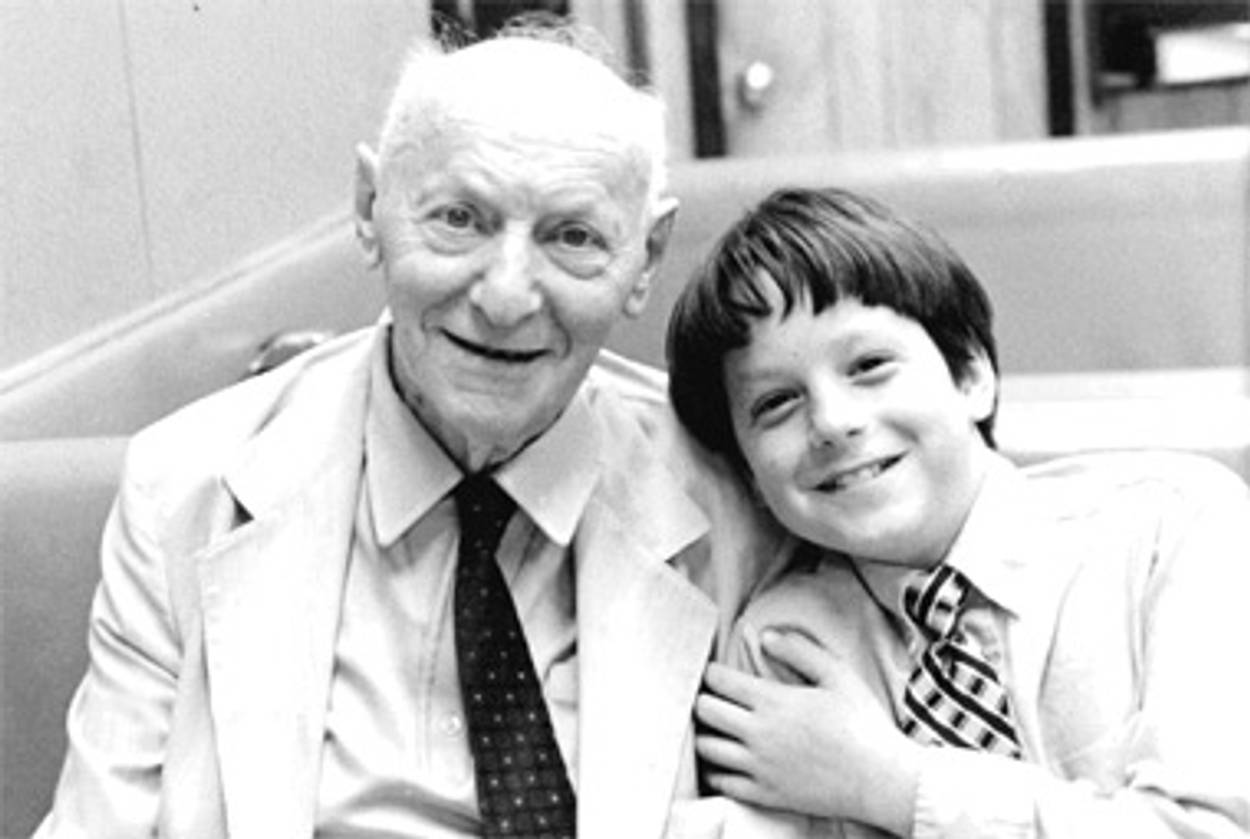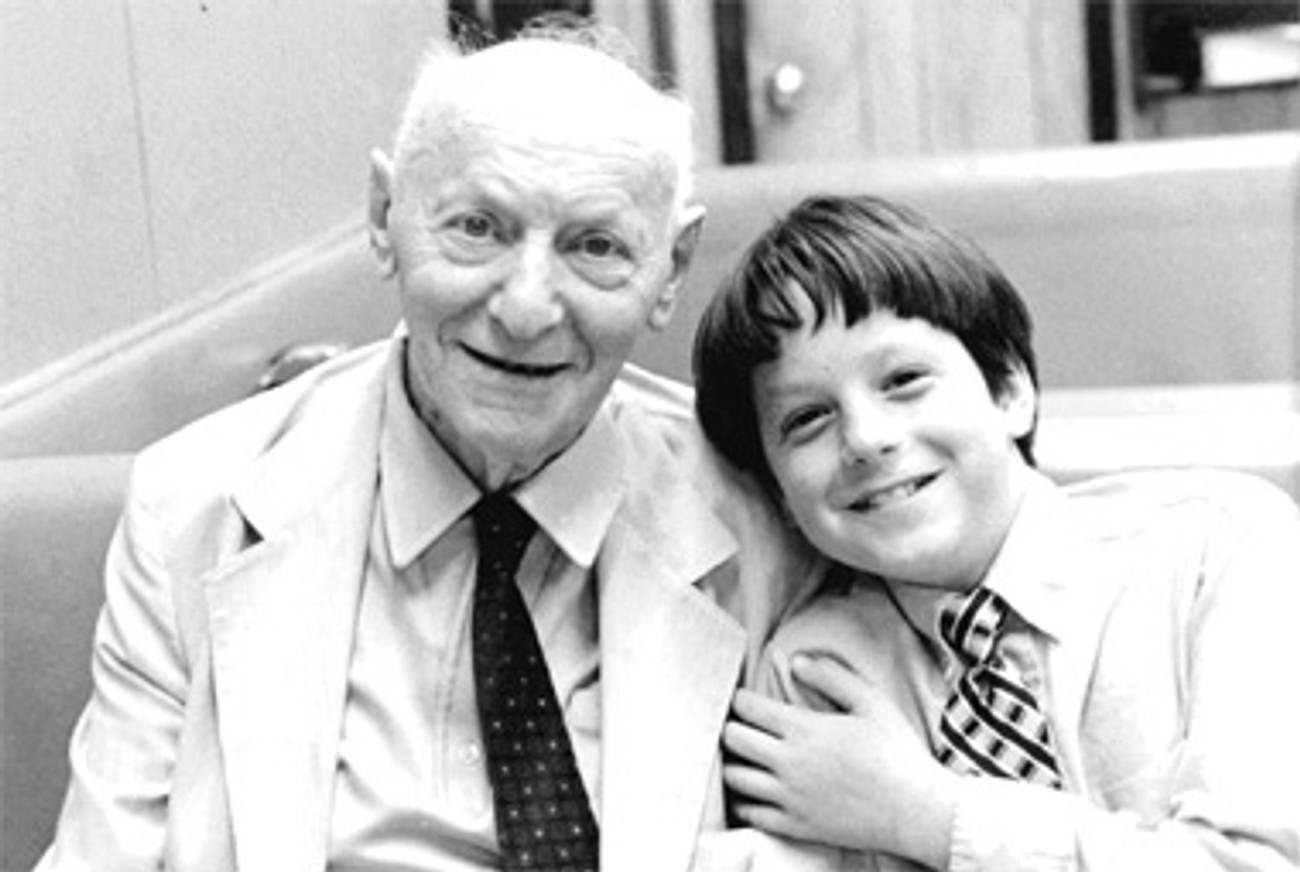Magic Keys
Promised a prized object, an aspiring writer and family friend helped Isaac Bashevis Singer’s widow sort through his possessions. But some things will always remain out of reach.




Yesterday marked the 20th anniversary of the death of the great Yiddish writer Isaac Bashevis Singer. It is a poignant day for many of the writer’s ardent fans, but July 24 has always been an especially sad day for me—a yearly reminder of the afternoon I was asked to help dispose of the Nobel Prize winner’s personal effects.
The Singers had been family friends since I was 10 years old, when my mother interviewed Isaac for an article in the Washington Post. He and I struck up a friendship, and subsequent invitations for tea and living-room chocolates in his apartment in Surfside in Miami Beach became one of the highlights of my Jewish education. I remember one afternoon in particular, when I brought along my Torah portion to rehearse for him and his wife, Alma. Isaac recited his own Torah portion along with mine—as if it were a Jewish opera or a call and response prayer. I remember being impressed that more than six decades after his own bar mitzvah, Isaac was able to recite every word from memory.
My mother and I regularly met Isaac at a drug store soda fountain in Surfside, for his favorite food—grits, which probably reminded him of kasha—while I had a grilled cheese and fries that he and I would share. “I think we merge with the life of the universe,” he once told me, during a conversation about life after death. “When a bubble bursts over the ocean, the water in the bubble falls back into the sea. It goes back to its source. It really does not disappear.”
Several years after Isaac has passed, I received a call from Alma—we both lived in Manhattan by then, she as a widow and me as a graduate student—asking for help. She needed someone to sort through all the clothes she still kept in their apartment at Broadway and 86th Street. As compensation, she offered to give me one of her husband’s typewriters—a gift of extraordinary meaning to an aspiring young writer who had learned so much about life at a young age from his books. What might it be like to roll Rodin’s sculpting tools in your hands, or to hold Marc Chagall’s surviving brushes over a blank canvas? Wouldn’t it be inspirational to play a few bars on Larry Adler’s favorite harmonica, or forcefully connect with a strong chord or passage on Rachmaninoff’s writing piano?
“There are three,” Alma said matter-of-factly of the typewriters. “One of them you can take with you after we’re done.”
It occurred to me that it might make more sense for her to donate them to a museum or a university library, but I knew I’d be an excellent caretaker. And admittedly, I hoped having Isaac’s typewriter in my modest apartment on West 113th Street might serve as a sort of talisman or magnet to draw some of the complicated, mysterious women he had written about so vividly in Enemies, A Love Story and The Magician of Lublin.
***
I passed through the massive gated archway on the Belnord’s south entrance and went up to her apartment. Alma came to the door slowly and didn’t smile as she greeted me. She was older than I had remembered, and her face seemed frozen in a frown of resignation and loneliness. A pang of guilt reminded me of the other reason I had volunteered for this assignment. I had walked past this enormous stone building on West 86th Street nearly every day on my way to what I still called “the 1/9” and had often seen Alma pulling a wire cart full of groceries and other sundries as I rushed to catch the subway. Had I not been habitually racing to wherever I needed to be in those days, I would have stopped to help, I reasoned.
But this Saturday would be different. I would be there for as long as Alma needed me. After an obligatory plate of prune pastry and marzipan, she explained that this was going to be a disposal operation, rather than a sorting-and-packing job or prep work for a charitable donation.
“You don’t want to save everything?” I asked, puzzled.
“I did save everything,” she replied flatly. “How much longer must I keep it?”
Several people had apparently made promises to stop by and cart off whatever she had left to various organizations, but they never arrived, and Alma had gotten tired of waiting; she wanted everything out.
“You can take whatever we don’t throw away,” she said.
She then beckoned me to follow her into a room that was already piled high with turquoise seersucker jackets, blue rubber tennis shoes, and old, worn straw hats. Ah, the straw hats with turquoise blue bands! They seemed a part of a blue-and-white uniform Isaac wore in his days of walking in the ocean breezes of Surfside. Could a man’s life be reduced to this? A stack of hats, a pile of socks, and some frayed undershirts?
“You should try this jacket,” Alma said, attempting to drape one of his seersuckers over my shoulders. Alma seemed to want to believe that his jackets would fit like the proverbial father’s hand-me-downs but, alas, it was at least two sizes too small. The jacket, along with everything else that didn’t fit—shoes, slacks, belts, and even his undershirts—went into the trash bags unsorted, in armful after armful for the garbage truck.
As I helped gather everything for the garbage collectors I thought about happier days with Isaac and Alma in their sunny Florida living room, where he and I would ponder the meaning of the universe, Spinoza’s teachings, and ghosts. But on this lonely Saturday afternoon in the New York present, there were no philosophical discussions of metaphysical reality. Only the sad and halting “yes” or a “no” in regard to what should stay and what should go among the remnants of a man who regaled millions with stories of Old World dybbuks, malevolent spirits, and often rakish protagonists visiting their complicated, passionate mistresses.
In that room a passage from The Cafeteria, one of Isaac’s short stories, came to me:
“I have been moving around in this neighborhood for over thirty years—as long as I lived in Poland,” he had written. “I know each block, each house. There has been little building here on uptown Broadway in the last decades, and I have the illusion of having put down roots here. I have spoken in most of the synagogues. They know me in some of the stores and in the vegetarian restaurants. Women with whom I have had affairs live on the side streets. Even the pigeons know me; the moment I come out with a bag of feed, they begin to fly toward me from blocks away.”
“What would they think of him now, reduced to a pile of undershirts?” I thought, as I glanced around the room for the typewriters.
As the afternoon wore on, I wondered if the belongings of someone whose work had been translated into so many languages and whose visage had been memorialized in enormous caricature on a wall of the Barnes & Noble on 82nd Street should be better preserved—or at least acknowledged with a prayer for such things. Was there a yizkor I could say after tying up the twist-tie on each bag?
Had his spirit been present in the room that day, Isaac might’ve simply shrugged. He had told me many times in my youth that “women are the only people who take life seriously. Men know it’s a joke.” The day’s purge was the wish of his widow, who had certainly earned the right to make such decisions. Alma had supported Isaac in the early days when they were first married by working as a salesgirl at Lord & Taylor while Isaac stayed home to write. She had also stayed with him over the years despite his detachment while writing and in defiance of his other romances. “Ours is a real marriage,” I remembered him once telling my mother.
Alma interrupted my reverie: “Do you want some lemonade?”
“Sure,” I said.
***
Several hours later, I finally stumbled across the typewriters in a closet. There was an old Royal with many of its keys mashed down and its teeth all jumbled and seemingly fused together. There was a second, white plastic manual typewriter that looked like it might be a starter toy or somebody’s idea of a “portable” device back in the 1970s. And finally, there was a beige IBM Selectric that used a center-strike ball.
Noticing my lingering fascination, Alma sighed heavily and told me that the typewriters had already been promised to others and that she was sorry she could not let me have one after all. I was unable to hide a twinge of surprise.
“Really?” I asked. “Not even the mangled old Royal with its snarled keys?”
I stared at the typewriters half-expecting them to emanate shafts of light and spiritual energy, like the lost Ark of the Covenant. Without possessing one of them, how would I ever be empowered by Isaac’s mystical literary powers and be energized with whatever charisma had made him such an intriguing figure to so many people?
But the situation itself was the prize—a turn of events straight out of one of Isaac’s own short stories: A young man, a writer even, is crushed to learn that some things are forever out of reach, that promising ventures often have disappointing outcomes, and that so many journeys that should lead on to fortune take the brave and fearless down winding roads to unhappy endings. I had wanted to take possession of a mystical object that would afford temporal (and possibly libidinous) benefits by mere ownership, but, at the end of the day, I saw much more clearly how our experiences and setbacks inform truly great works of art.
“I see,” I said, trailing. “No problem.”
What else could I say to the widow who had been through so much?
As I walked east along Isaac Bashevis Singer Boulevard toward Central Park, it occurred to me that I would have to seek out experiences to generate my own stories, buy my own seersucker jacket—one that fit—and be on the lookout for the mysterious women living along the side streets. I reflected also that, in any event, Isaac had actually composed many of his best fables and universal allegories while sitting on a couch, writing longhand in pencil.
Reed Martin is the author of The Reel Truth: Everything You Didn’t Know You Need to Know About Making an Independent Film and a former business case writer in the Global Research Group at Harvard Business School.
Reed Martin is the author of The Reel Truth: Everything You Didn’t Know You Need to Know About Making an Independent Film and a former business case writer in the Global Research Group at Harvard Business School.